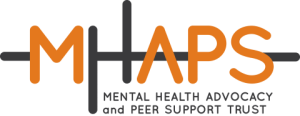There are many forms of support available to you if you are struggling with a mental health or addictions issue.
People often make a start with individual support from a peer support worker. This is usually an easy relationship to start because all support workers have their own lived experience of a mental health or addictions issue. Straight away you are likely to feel less alone and better understood.
Depending on your needs talking with or meeting a peer support worker may be a just single contact or one of a series. Our focus is on helping you towards whatever your definition of living well is and often this work involves problem solving and thinking creatively.
Here are a number of ways in which this support can be provided.
Advocacy
‘Advocacy seeks to represent the interest of the powerless client to powerful individuals and social structures.’ ~ (Payne, 1995)
Advocacy is essentially helping another person to obtain something from someone in power.
We can support you to have your voice heard at appointments, inform you of your rights, and help if you want to make a complaint and many other tasks that negatively impact on recovery. They can assist you in situations including ACC, Accommodation referrals, Child Youth and Family, Counselling referrals, Employment issues, Landlords, Lawyer referrals, Medical professionals, Social Services, Tribunals, Work & Income and anyone similar whom you may need support with.
Advocates will only ever act on your issues, with your permission.
All our advocates have had personal experience of mental health services, and can assist you in a great many situations where you may be struggling to speak for yourself. The help you want may be just someone to talk to and plan with or you may need one of our advocates to accompany you to a meeting and even to speak on your behalf.
Peer Support
For people with anxiety, depression or bipolar disorder, peer support offers a truly mutual experience.
Peer support workers who have their own experience of a particular mental health issue and so can be matched with clients who are struggling with the same issue and wanting information or support to help their recovery. Peer support is both a philosophy and a conscious practice that arises from people with their own lived experience providing support and services to others.
MHAPS works with people as individuals using a model known as Intentional Peer Support. Here the emphasis is on ‘being with’ and ‘doing with’ rather than doing for or doing to. In this way the ‘power’ in the relationship is shared.
Our shared experience and role modelling of recovery can assist people to regain hope in their ability to live well despite any mental health issue.
Our peer support workers also use the Te Whare Tapa Wha model of wellbeing that represents a holistic approach to wellbeing and recovery.
Peer support is well accepted and known to be effective.
Addictions Advocacy and Peer Support
An addictions advocate can serve as a ‘navigator’ through the Alcohol and Other Drugs treatment services. We can support you to have your voice heard at appointments, inform you of your rights, and help if you want to make a complaint and many other tasks that negatively impact on recovery.
All our advocates have had personal experience with alcohol and addictions and can assist you in a great many situations where you may be struggling to speak for yourself. As people who have used alcohol and drug services, we will listen and treat you with respect.
Our service is free and confidential and we will only ever act on your issues with your permission.
